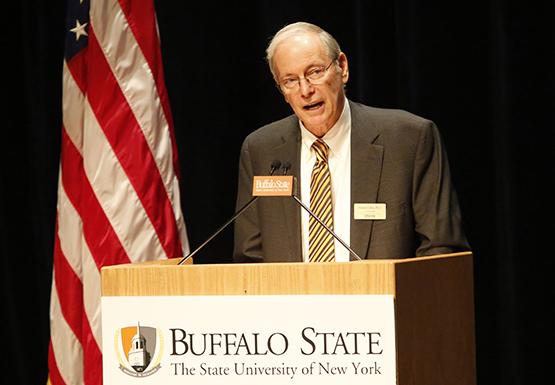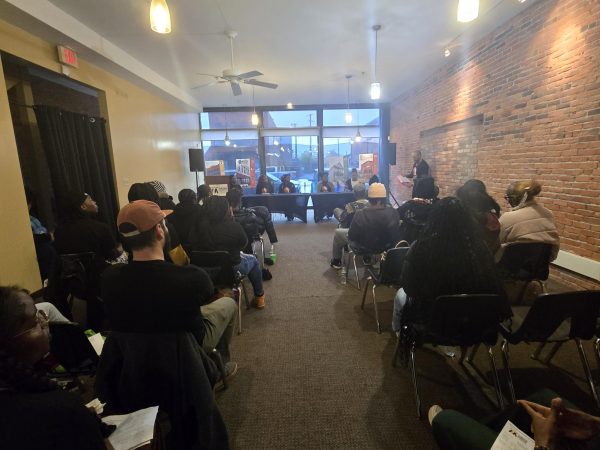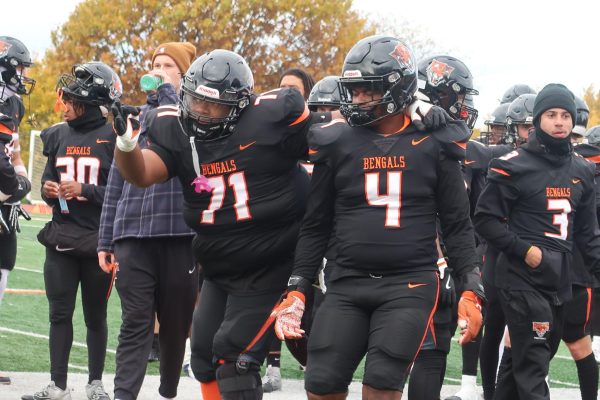Cohen addresses campus, prepares for ‘year of transition’

Interim President Howard Cohen addressed students and staff for the first time during his campus address on Sept. 3 in Rockwell Hall.
Interim President Howard Cohen addressed campus for the first time Tuesday afternoon, laying out six issues Buffalo State will be dealing with this year.
Cohen began the address by introducing himself, and paying respects to former President Aaron Podolefsky, who passed away in August.
“This will be a year of transition for us,” Cohen said, “as we prepare the college for its next president.”
Among the issues facing the school, Cohen laid out six as the most important.
The new interim president also joked about Buffalo’s reputation with snow.
“You can’t intimidate me with tales of winter,” he said. “I grew up in Minnesota and lived in Green Bay for six years. I have come to understand that ‘Buffalo snow’ is a scare tactic used by the locals to keep this beautiful and interesting city from becoming too crowded.”
Cohen said the biggest issue is declining enrollment. Enrollment numbers have been down for the last two years, after peaking in the Fall 2011 semester. Growing enrollment is vital, he said.
“We must find ways to stem the decline and recapture the revenue that we lost along with our student enrollments,” Cohen said. “Our task this year is to bring revenue and expenses back into balance — and the most productive way to do that is by growing enrollment.”
Cohen said the school is taking “immediate steps” to tackle retention issues. The school will also look into better ways to recruit students to Buffalo State.
The second issue Cohen addressed is strategic planning. Citing President Barack Obama’s speech at the University at Buffalo in August, Cohen said Buffalo State needs to lay out the value it provides to students.
“SUNY tuition is very affordable and, at Buffalo State, student debt at graduation is well below the national average,” he said. “However, our challenge is to clarify our strategic position in relation to the other choices of potential students and supporters. We need to identify the value we offer and work to make it a reality that is well understood.”
Cohen also addressed budgeting, institutional sustainability and the southwest corner of campus.
“The southwest quadrant of the campus is a natural second front door for Buffalo State,” he said. “The campus has a variety of needs and opportunities that could be situated there: additional student housing, an alumni and visitor center, additional parking, and community partnership spaces — to name the most obvious.”
The interim president also discussed economic development and Buffalo State’s role in Start-Up NY. Start-Up NY is an initiative by Gov. Cuomo meant to increase entrepreneurialism and job creation through tax-free communities set up by SUNY and CUNY schools and independent colleges and universities.
“This economic revitalization initiative is designed to foster entrepreneurialism and job creation on a large scale in association with public higher education through tax-free communities across the state, and specifically in our region,” he said. “SUNY, along with other college communities, will serve as the framework for the Start-Up NY program that is designed to attract companies to bring their ventures to Upstate New York by offering new businesses the opportunity to operate tax-free while partnering with world-class SUNY campuses, like Buffalo State.”
Cohen also addressed some of the successes Buffalo State has had in the last year, including the 10-year reaccreditation by the Middle States Commission on Higher Education, the opening of several new and updated campus facilities and the Transforming Lives campaign, which has raised $16.5 million of its $20 million goal.
With more than 1,760 students participating in service learning classes in 2012-13, Cohen also touted Buffalo State’s commitment to the surrounding community.
“As I meet members of our community, it is clear that Buffalo State’s impact extends well beyond our campus,” he said. “Clearly, Buffalo State recognizes its obligation to the larger community and so we remain committed to building even stronger civic and community engagement. This is also demonstrated by our generous faculty and staff who provide service in countless ways in our surrounding communities, making each of them an integral part of the vibrancy of this area.”
Michael Canfield can be reached by email at Canfield.Record@live.com.






